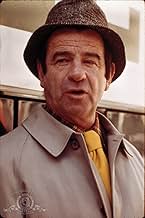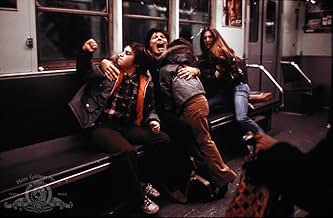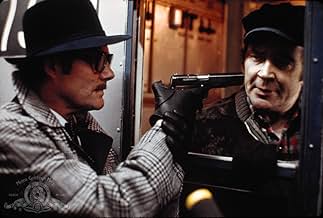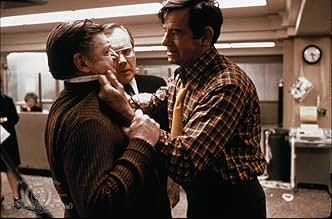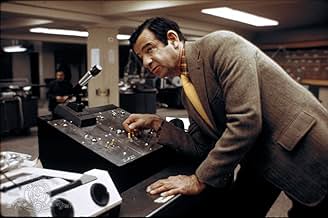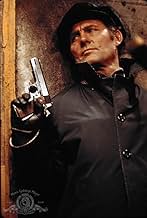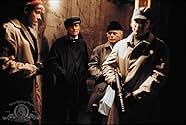À New York, des hommes armés détournent une rame de métro et demandent une rançon pour les passagers. Même si c'est payé, comment pourraient-ils s'en sortir?À New York, des hommes armés détournent une rame de métro et demandent une rançon pour les passagers. Même si c'est payé, comment pourraient-ils s'en sortir?À New York, des hommes armés détournent une rame de métro et demandent une rançon pour les passagers. Même si c'est payé, comment pourraient-ils s'en sortir?
- Réalisation
- Scénario
- Casting principal
- Nomination aux 2 BAFTA Awards
- 3 nominations au total
Kenneth McMillan
- Borough Commander
- (as Kenneth Mc Millan)
Avis à la une
There are many disappointing action pictures out there – this is not one of them. The genius of the film is there is no wasted motion. The picture starts right with the plot – no introduction or character development. The characters are allowed to develop as the plot moves along.
Which brings us to pacing – the pacing in this picture is excellent. It moves right along and never stops, never slows, never goes too fast. This is the strongest element of its success.
Another strength is its economy of motion. Many action pictures bore us with unneeded car chase scenes, shoot-em-ups, explosions and other mayhems that are used as filler when true creativity comes up short. This film needs none of that. Only that which is necessary is shown. Only that which needs speaking is spoken. This film is deftly written and crafted with great economy and this underpins the excellent pacing. It moves right along because there is no wasted motion as there is in most other action pictures.
This does not mean there is no action, there is fabulous action, but only such action as is necessary to move the plot along. There is no action simply to occupy time until the requisite 90 minutes are up.
The directing is equally economical. No fancy shots, shaky cameras, or special effects – just good, straight forward directing.
I doubt this picture could be made today for the above reasons. The script readers would reject it for 'lack of development'; 'not enough action'; 'no romantic interest'; and all the other brainless formulas script readers dole out. The producers would demand 'more action' and 'camera work' from the directors. And, of course, a romantic interest (in some state of undress) would have to be shoe horned in.
Film students should study this picture. From it they will learn that brevity is a virtue and mindless formulas are just that - mindless.
Which brings us to pacing – the pacing in this picture is excellent. It moves right along and never stops, never slows, never goes too fast. This is the strongest element of its success.
Another strength is its economy of motion. Many action pictures bore us with unneeded car chase scenes, shoot-em-ups, explosions and other mayhems that are used as filler when true creativity comes up short. This film needs none of that. Only that which is necessary is shown. Only that which needs speaking is spoken. This film is deftly written and crafted with great economy and this underpins the excellent pacing. It moves right along because there is no wasted motion as there is in most other action pictures.
This does not mean there is no action, there is fabulous action, but only such action as is necessary to move the plot along. There is no action simply to occupy time until the requisite 90 minutes are up.
The directing is equally economical. No fancy shots, shaky cameras, or special effects – just good, straight forward directing.
I doubt this picture could be made today for the above reasons. The script readers would reject it for 'lack of development'; 'not enough action'; 'no romantic interest'; and all the other brainless formulas script readers dole out. The producers would demand 'more action' and 'camera work' from the directors. And, of course, a romantic interest (in some state of undress) would have to be shoe horned in.
Film students should study this picture. From it they will learn that brevity is a virtue and mindless formulas are just that - mindless.
One of my favorite films from the seventies is The Taking of Pelham One, Two Three because it's so New York. Of course the film was shot entirely on location in The Big Apple including the interiors which helped greatly. But more than that, the characters have all the New York flavor about them with one exception.
The cat of course is led by Walter Matthau who plays a Transit Police Lieutenant. His character is a kind of combination of Archie Bunker and Detective Lennie Briscoe from Law and Order, in many ways not terribly admirable. He's also a transit cop and at that time the Transit Police were a separate entity. They were merged into the regular NYPD during the Giuliani administration.
There's no real glory in the Transit Police, these guys were mostly charged with dealing with drunks and kids with loud boom boxes. If a homicide ever occurred the NYPD quickly took it over as they would in most situations. But this ongoing crisis on a train on the Lexington Avenue Local occurs on his watch and it's career make or break case that Matthau is very aware of. And he proves fully capable during the crisis.
The crisis is four men, Robert Shaw, Earl Hindman, Hector Elizondo, and Martin Balsam mount a carefully planned assault on a subway train out of Pelham Bay station in the Bronx in mid-Manhattan and hold it and the passengers for ransom for a million dollars. The outsider to New York is Robert Shaw in one of his best roles, a former British army officer and mercenary. During the course of the robbery they kill a station supervisor played by roly poly Tom Pedi, one very quintessential New Yorker and their coldblooded villainy is established.
In fact the whole cast is a microcosm of the ethnic strains of New York City which makes the film so enjoyable, especially to one who lived there, the first 49 years of his life. Even the mayor is portrayed as a weak, fumbling nonentity and back then our mayor was one Abraham D. Beame who was just that, probably one of the worst mayors the city ever had. Tony Roberts has a very good role as the tough as nails Deputy Mayor concerned about both his boss's political career and resolving the crisis.
The Taking of Pelham One Two Three once the hijack is done is suspense filled and doesn't let up for a moment. I can't give the ending away, but the final shot of Walter Matthau's face as the end title music starts and the credits begin to roll is priceless.
The cat of course is led by Walter Matthau who plays a Transit Police Lieutenant. His character is a kind of combination of Archie Bunker and Detective Lennie Briscoe from Law and Order, in many ways not terribly admirable. He's also a transit cop and at that time the Transit Police were a separate entity. They were merged into the regular NYPD during the Giuliani administration.
There's no real glory in the Transit Police, these guys were mostly charged with dealing with drunks and kids with loud boom boxes. If a homicide ever occurred the NYPD quickly took it over as they would in most situations. But this ongoing crisis on a train on the Lexington Avenue Local occurs on his watch and it's career make or break case that Matthau is very aware of. And he proves fully capable during the crisis.
The crisis is four men, Robert Shaw, Earl Hindman, Hector Elizondo, and Martin Balsam mount a carefully planned assault on a subway train out of Pelham Bay station in the Bronx in mid-Manhattan and hold it and the passengers for ransom for a million dollars. The outsider to New York is Robert Shaw in one of his best roles, a former British army officer and mercenary. During the course of the robbery they kill a station supervisor played by roly poly Tom Pedi, one very quintessential New Yorker and their coldblooded villainy is established.
In fact the whole cast is a microcosm of the ethnic strains of New York City which makes the film so enjoyable, especially to one who lived there, the first 49 years of his life. Even the mayor is portrayed as a weak, fumbling nonentity and back then our mayor was one Abraham D. Beame who was just that, probably one of the worst mayors the city ever had. Tony Roberts has a very good role as the tough as nails Deputy Mayor concerned about both his boss's political career and resolving the crisis.
The Taking of Pelham One Two Three once the hijack is done is suspense filled and doesn't let up for a moment. I can't give the ending away, but the final shot of Walter Matthau's face as the end title music starts and the credits begin to roll is priceless.
I am biased a little with this film to begin with, as I live in NYC and am a big subway fan. So a gritty 70's flick that takes place in a NYC subway sounds good to me! But the truth is, this film is a great film full of extremely talented actors with a dynamite story. Shaw and Matthau are the obvious stars with everyone else putting in a good co-starring role.
The story takes place on the "6" train no less, which happens to be my fave subway line! It was a great surprise when I found the DVD for only ten bucks, I would have paid a normal price. And the quality of the DVD transfer is VERY nice. The film, though a bit brutal sometimes, even has some decent humor, even the ending is kinda funny, but perfect. I recently watched this on TV, just to compare the two versions and see where all the cuts and edits were. You can't go wrong with this film.
The story takes place on the "6" train no less, which happens to be my fave subway line! It was a great surprise when I found the DVD for only ten bucks, I would have paid a normal price. And the quality of the DVD transfer is VERY nice. The film, though a bit brutal sometimes, even has some decent humor, even the ending is kinda funny, but perfect. I recently watched this on TV, just to compare the two versions and see where all the cuts and edits were. You can't go wrong with this film.
A group of criminals highjack a subway train and demand $1 million from New York City. Transit cop, Lt. Garber tries to work the situation out, but it seems the gang have planned everything to the second and are running the show. Garber tries to get one step ahead of the gang.
Of course now everyone knows this film because of the supposed connection to Reservoir Dogs, in that the criminals are colour coded instead of names. However even without this cult reference this film deserves to be watched and enjoyed. The story exists on two levels. First we have the setup it also acknowledges that it is the usual disaster movie setup .the majority of characters are listed in the credits as stereotypes instead of people (ie, `the pimp' `the junkie' etc). However this is not a weakness as the thriller story is solid enough to carry the film. It isn't all action but it's very tense and interesting. What really tops it off is the thick vein of humour that runs through it mostly coming from Matthau.
Matthau shows how wonderful he is and how he manages to do well in so many different film styles. His world-weary act is great and his Brooklyn accent is pushed to the fore. Roberts Shaw is also good, but has less of a character and is working hard to sound English. The cast is actually deep in faces we have an almost unrecognisable Elizondo, Woody Allen actor Tony Roberts, a fantastic Mayor from Wallace and Jerry Stiller (Ben's dad), who doesn't look much older today than he did then!
Overall this is very enjoyable, but it is made by Matthau. The thriller plot stands up well despite the lack of modern fireworks. A cult classic in the making.
Of course now everyone knows this film because of the supposed connection to Reservoir Dogs, in that the criminals are colour coded instead of names. However even without this cult reference this film deserves to be watched and enjoyed. The story exists on two levels. First we have the setup it also acknowledges that it is the usual disaster movie setup .the majority of characters are listed in the credits as stereotypes instead of people (ie, `the pimp' `the junkie' etc). However this is not a weakness as the thriller story is solid enough to carry the film. It isn't all action but it's very tense and interesting. What really tops it off is the thick vein of humour that runs through it mostly coming from Matthau.
Matthau shows how wonderful he is and how he manages to do well in so many different film styles. His world-weary act is great and his Brooklyn accent is pushed to the fore. Roberts Shaw is also good, but has less of a character and is working hard to sound English. The cast is actually deep in faces we have an almost unrecognisable Elizondo, Woody Allen actor Tony Roberts, a fantastic Mayor from Wallace and Jerry Stiller (Ben's dad), who doesn't look much older today than he did then!
Overall this is very enjoyable, but it is made by Matthau. The thriller plot stands up well despite the lack of modern fireworks. A cult classic in the making.
... Thank Goodness it wasn't!
I switched on me TV last night after an evening out and the opening credits of Pelham was just finishing. Not knowing the name of this film (the Carry On listing was clearly not being shown, perhaps the Producer-dude had a revelation of taste!) I began to watch it half-heartedly, whilst prostrate on the sofa.
By the end of the movie, and that glorious last look from Matthau, I was sitting blot-upright with the biggest grin I've had on my face at 2am for a long time!
What a flick! What a film! How good was this simple, little, under-rated, under-stated movie? Very.
See this film, forgive it for being written in the 70-ties, in fact revel in that non-PC fact (the Chinese/Lady jokes are, retrospectively, quite amusing, in a non-Carry On way).
They just don't make 'um like this anymore. Simple, sweet, suspense.
I switched on me TV last night after an evening out and the opening credits of Pelham was just finishing. Not knowing the name of this film (the Carry On listing was clearly not being shown, perhaps the Producer-dude had a revelation of taste!) I began to watch it half-heartedly, whilst prostrate on the sofa.
By the end of the movie, and that glorious last look from Matthau, I was sitting blot-upright with the biggest grin I've had on my face at 2am for a long time!
What a flick! What a film! How good was this simple, little, under-rated, under-stated movie? Very.
See this film, forgive it for being written in the 70-ties, in fact revel in that non-PC fact (the Chinese/Lady jokes are, retrospectively, quite amusing, in a non-Carry On way).
They just don't make 'um like this anymore. Simple, sweet, suspense.
Le saviez-vous
- AnecdotesIn a TVO (Ontario, Canada) interview, the producer said that this film did terrific box office in New York, Toronto, London and Paris--all cities with subways--but was considered a flop in the rest of the world.
- GaffesThe relevant section of the Lexington Avenue Line includes curves sharp enough to have speed-controlled signals. As Mr. Green would have known, these cannot be cleared to green in advance of the train's arrival and will not clear if it is running away.
- Citations
Lt. Garber: [looking for the inspector] Inspector Daniels?
Inspector Daniels: [identifying himself] Daniels.
Lt. Garber: [realizing that Inspector Daniels is Black] Oh, I, uh, thought you were, uh, like a shorter guy or... I don't know what I thought.
- Crédits fousAlthough many of the scenes in this film were taken on transit property, the New York City Transit Authority is not responsible for plot, story and characters portrayed. The Authority did not render technical advice and assistance.
- ConnexionsEdited into Superman III (1983)
Meilleurs choix
Connectez-vous pour évaluer et suivre la liste de favoris afin de recevoir des recommandations personnalisées
Détails
- Date de sortie
- Pays d’origine
- Langues
- Aussi connu sous le nom de
- El tomar de Pelham uno dos tres
- Lieux de tournage
- Gracie Mansion, Manhattan, Ville de New York, New York, États-Unis(mayor's home - exteriors)
- Sociétés de production
- Voir plus de crédits d'entreprise sur IMDbPro
Box-office
- Budget
- 5 000 000 $US (estimé)
- Montant brut mondial
- 364 $US
Contribuer à cette page
Suggérer une modification ou ajouter du contenu manquant


